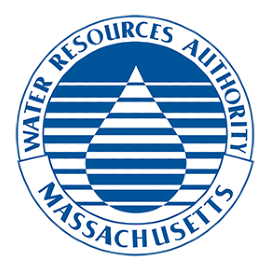In addition to conducting hundreds of thousands of water quality analyses of regulated contaminants for compliance monitoring and treatment process control, MWRA collects many other samples to understand more about our water, to track how the system is working and changing over time, and to help researchers and EPA regulators determine if new water quality standards are needed.
MWRA publishes an Annual Water Quality Report, focused primarily on regulated water quality parameters and a more detailed monthly report. More information on MWRA's key performance measures for water quality, maintenance, and financial management can be found here. Additionally to all the data regularly published in those reports, MWRA believes that our users should have access to the water quality data we collect on a periodic basis for other purposes.
Special Health Considerations: Important Information for People with Weakened Immune Systems
According to the Center for Disease Control (CDC), drinking water is not the primary pathway for infection by Giardia or Cryptosporidium.
Some people may be more vulnerable to contaminants in drinking water than the general population. Immuno-compromised persons such as persons with cancer undergoing chemotherapy, persons who have undergone organ transplants or dialysis, and people with HIV/AIDS or other immune system disorders can be at increased risk from protozoa. People who are immuno-compromised should seek advice from their health care providers to make the right decisions about water consumption.
Although data are not sufficient for EPA/CDC to recommend that all severely immuno-compromised persons take extra caution with regards to their drinking water, individuals who wish to take extra measures to avoid waterborne Cryptosporidiosis can bring their drinking water to a full boil for one minute. Boiling water is the most effective way of killing Cryptosporidium.
FOR PEOPLE WITH WEAKENED IMMUNE SYSTEMS OR WITH HIV/AIDS:EXTRA PRECAUTIONS TO AVOID CRYPTOSPORIDIOSIS & GIARDIASIS |
|---|
| If you are HIV positive or otherwise immuno-compromised, be extra careful about hand washing. |
| Carefully wash food before eating, and thoroughly cook foods which need heating before eating. Do not let raw foods contaminate other foods. |
| Avoid drinking or accidentally swallowing water from lakes, rivers, or swimming pools. |
| Follow "safe sex" guidelines. Any sex act that involves contact with the anus or feces increases the risk of cryptosporidiosis. |
| Drinking water that is considered safe for persons with healthy immune systems may not be healthy for those with weakened immunity. You may want to discuss the need for taking further protective measures with your medical provider. |
A list of potential contaminants that are routinely tested for in the MWRA water system.
Unregulated Disinfection Byproducts
EPA and MassDEP regulate two classes of disinfection byproducts as groups with a single Maximum Contaminant Level (MCL) for each group. MWRA monitors for each individual compound in the group, and reports the sum compared to the MCL for regulatory purposes.
The data below are the individual results for each of the detected individual compounds.
MetroBoston data is based on data collected in the fully-supplied MetroBoston communities served by the Carroll Water Treatment Plant. Data for partially supplied MetroBoston communities is available in each community’s water quality report.
Special Initiatives with the Public Health Community
As part of its Water Supply Improvement Program, MWRA has partnered with public health professionals on a series of projects. All of these projects are tied to MWRA's overall program to improve and protect drinking water through cost-effective efforts that are directly related to public health benefits, such as:
Coordination with public health officials and water superintendents | MWRA maintains close working relationships with state and local public health and water officials through an advisory committee and a monthly water quality report. MWRA promotes interaction between health and water departments in all communities. |
Cooperative research and surveillance projects | MWRA continues to enhance extensive water quality testing programs and works with state and City of Boston public health agencies to track health outcomes inside and outside the MWRA system and to implement an early-warning system of possible trouble. |
Annual water quality report | To help answer customers' questions about their drinking water, MWRA issues an annual water quality report (also known as "consumer confidence report") each June/July. |
Lead exposure education efforts | While water is lead-free coming from the reservoir, MWRA has made efforts to make chemistry changes to reduce leaching of lead from homes' lead pipes. MWRA also has a public education campaign to educate homeowners how to reduce lead exposure from drinking water. |
Public Health Advisory Group | Experts and practitioners assist MWRA in determining the most cost-effective manner of providing the highest level of public health benefits. |
For more information, please contact: Beverly Anderson, MWRA Public Health Project Manager
PAPERS AND FACT SHEETS
Back to the Future:
Water Supply and Public Health — A Mission To Share Nov 1999
Reaching Out to Health Care Providers
Panel Presentation - Making Waves II Mar 2000
